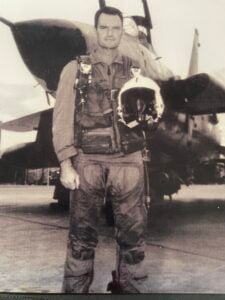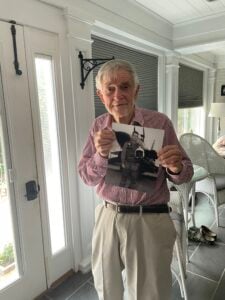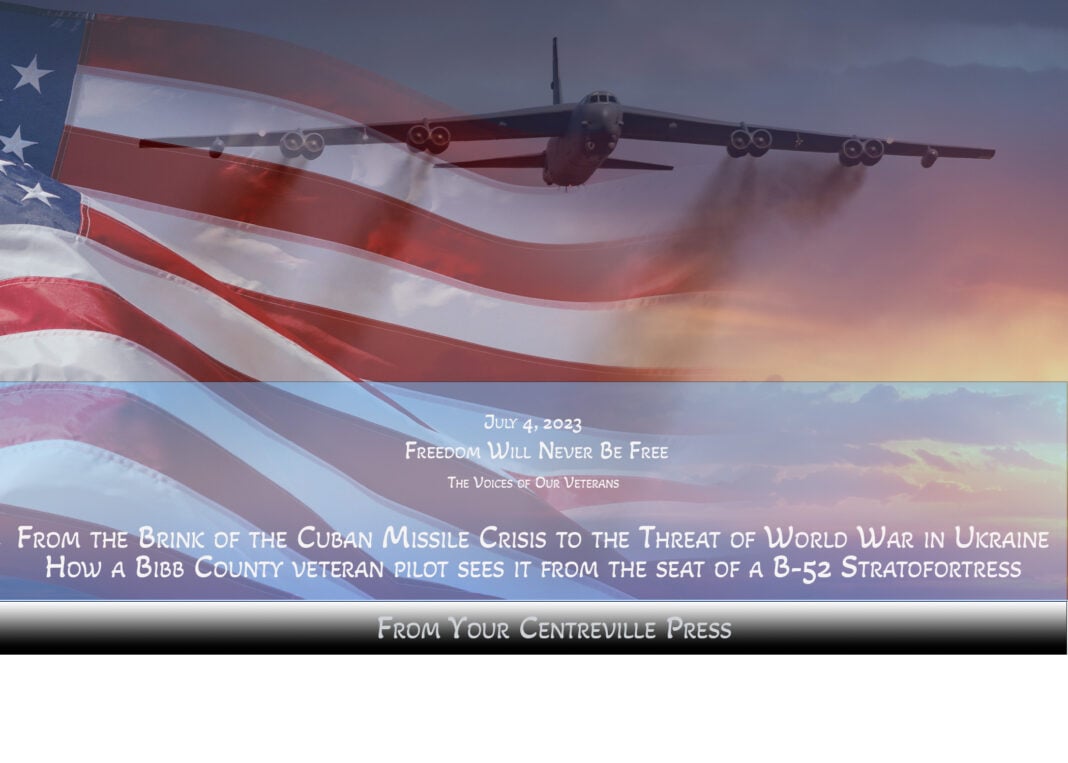Editorial by Mike Hobson
During the 1962 Cuban Missile Crisis, the United States and the Soviet Union came dangerously close to nuclear war. The situation was incredibly tense, and there were several moments when the risk of a nuclear conflict seemed imminent. The crisis is widely regarded as one of the most perilous moments in the Cold War.
At the height of the crisis, the United States discovered that the Soviet Union was secretly deploying nuclear missiles in Cuba, which could potentially reach major American cities within minutes. The U.S. government saw this as a significant threat to national security. In response, the United States established a naval blockade around Cuba to prevent further Soviet shipments and demanded the removal of the missiles.
As tensions escalated, both the United States and the Soviet Union prepared for the possibility of military action. The United States military increased its readiness level, and there were discussions within the U.S. government about the potential invasion of Cuba. President Kennedy warned that any missile launched from Cuba would be considered an attack on the United States, and the U.S. was prepared to respond with full force.
On the Soviet side, there were debates among the leadership about whether to use the nuclear weapons they had placed in Cuba. Some Soviet officers in Cuba had been given the authority to launch missiles without direct approval from Moscow, which further increased the risk of accidental or unauthorized escalation.
However, despite the high tensions and dangerous brinkmanship, both sides ultimately chose to pursue a peaceful resolution. Through intense negotiations and diplomatic efforts, the United States and the Soviet Union reached an agreement. The Soviets agreed to remove their missiles from Cuba, and the United States pledged not to invade Cuba and secretly agreed to remove its missiles from Turkey.
The Cuban Missile Crisis serves as a stark reminder of how close the world came to nuclear war. It highlighted the dangers of a direct confrontation between the two super powers.
A few days ago 69 year old Robert F. Kennedy Jr. appeared on a town hall event hosted by a national news media organization. He is the son of former Senator Robert F. Kennedy, who was assassinated in 1968 while he was seeking the U.S. Presidency, and the nephew of former U.S. President John F. Kennedy, who was assassinated in Dallas in 1963, for those readers too young to remember.
Quotes from RFK Jr.: “My uncle, President Kennedy was asked by his best friend what he wanted on his gravestone and he said “that he kept the peace.” JFK said the principal job of an American president is to keep the country out of war.”
“And I think, you know, particularly what we’re doing now in Ukraine is a departure from that and I don’t mean that, you know, I’m very, very sympathetic to the Ukrainian people and I am not sympathetic to Putin who invaded Ukraine brutally and illegally and unnecessarily. But we have, we have neglected many, many opportunities to settle this war peacefully.”
Source: Robert F. Kennedy Jr.’s Town Hall on NewsNation
RFK Jr.’s views on Ukraine are drawn after a lifetime of living in the political world and high stakes drama of the Kennedy family legacy and the history of his ancestors. He was 8 years old when his Attorney General father Robert and his Uncle President JFK faced down the first global threat of nuclear war the U.S. would face in 1962 when the Soviet Union sought to place nuclear weapons in Cuba.
During the height of the crisis, Robert Kennedy played a crucial role in facilitating communication between the United States and the Soviet Union. He engaged in a series of secret backchannel communications with Soviet Ambassador Anatoly Dobrynin, conveying the U.S. government’s position and seeking a peaceful resolution.
Robert Kennedy’s role extended beyond negotiations. He played a critical part in formulating the United States’ response to the crisis and assessing the potential consequences of various courses of action. His advice and counsel were highly valued by President Kennedy throughout the crisis.
Overall, Robert F. Kennedy’s involvement in the Cuban Missile Crisis was instrumental in shaping the United States’ strategy and facilitating communication with the Soviet Union, contributing to the successful resolution of the crisis.
As he grew older RFK Jr. learned the intricate details of the Cuban crisis well and has contrasted it with the current crisis in Ukraine.
Other quotes From RFK Jr: “one could see why they wouldn’t want us to have nuclear missile systems in hostile countries on their border. We would, we would, we should also agree to keep the, to keep NATO out of the Ukraine, which is what the Russians have asked. And I think based upon those three points, we could probably, somebody like me could settle this war. I don’t think the neocons are capable of settling in and the people who surround President Biden, I don’t think they’re capable of because they were the ones who created the problems. And I don’t think they’ll ever recognize that.”
“I think part of it, you know, a Russian settlement is to recognize that, that, you know, some of the, you know, some of this history that went into this war with them, you know, with the geopolitical machination on both sides. And by the way, I am not excusing or justifying Vladimir Putin’s barbaric in any illegal invasion of the Ukraine.”
“I’m just saying we need to figure out a way, you know, my uncle always said, if you want, if you want to actually achieve peace, you’ve got to put yourself in the other guy’s shoes and you got to figure out the pressures, the local pressures on him too. My uncle was surrounded by a military apparatus that wanted to go to war. And it could have gone anywhere from there, and the end of the crisis happened because my uncle reached out to Khrushchev directly and said, let’s settle this between ours and their, their settlement was secret and it remained secret for many years.”
“But my uncle wanted to settle it and he understood that he had to put himself in Khrushchev’s position and that Khrushchev didn’t want war and neither did he. But they were both surrounded by people who did want to go to war.”
“We should have listened maybe to Putin over many years. You know, we, we made a commitment to Russia to Gorbachev that we would not move NATO one inch to the east.
Oh, you know, why did we then we went in and we lied, we went into 13 NATO countries.
We put missile systems in that with nuclear, that would need nuclear capacity.
We we did joint exercises with the Ukraine and these others for NATO.”
Source: Robert F Kennedy Jr: “We need a peaceful revolution”
Bibb County resident Walter C. Williams is a local Senior citizen you may see around town driving an old beat up truck. You may see him attending County Commission meetings or City Council Meetings and stirring up the elected officials on a regular basis. He regularly keeps them on their toes.
Or, you might see him at monthly meetings of the Republican party. He is the tireless local citizen who continues to love his country and takes every opportunity to speak out about it to anyone who will give him the time to talk and listen. Even though he is 92 now, he was busy cutting the grass for the Presbyterian Church late Saturday evening when I caught him for this article.
Young people who might encounter Walt Williams might have no idea of his history. He is not what he may seem to be today. Just a few years ago the man was seated at the controls of some of the most powerful weapons of war this country has ever devised and his military experiences are powerfully relevant to the events that are unfolding on the global stages of today. The course of events now happening between Ukraine and Russia could affect every man, woman, and child alive today.
On October 14, 1962 Walt was the Captain of a 6 man B-52 bomber crew, part of the Strategic Air Command operating out of Biggs AFB in El Paso, TX. They routinely flew 24 hour missions, covering ground from El Paso to the North Pole, back down the West Coast, then Eastward to the Rio Grande. After his B-52 years he moved on to fly the infamous F-105 Thunderchief fighter over the skies of North Viet Nam between 1966-67, retiring from the USAF in 1977 with 20 years of service. He completed 82 successful missions over Vietnam and 10 over Laos.
The SAC bomber crews were addressed that infamous October day by President Kennedy about their role in the Cuban crisis. JFK told them to prepare for any eventuality, including nuclear war. They were flying “chrome dome missions” which meant that they had nuclear armed B-52’s in the air at all times, 24 hours per day. They were in the air, in Canadian airspace, with nuclear weapons aboard, and targets selected in Russia. At any time they could have received coded instructions to deliver their weapons on their targets.

Walt says that his experience in the command seat of a nuclear armed Boeing B-52 Stratofortress, the most capable bomber ever built by the United States, during the Cold War period taught him to be concerned about the survival of this nation , given what is going on in Ukraine today. He thinks the Cuban crisis diplomatic solution was the gold standard for negotiating peaceful solutions instead of military solutions for conflicts between countries. Historians tell us that the Cuban crisis is as close as we have ever been to a nuclear event, said Walt. Walt said that the Cuban confrontation was settled by give and take between Kennedy and Kruschev and a nuclear war was avoided. In today’s situation in Ukraine there has been no willingness to go to a negotiating table and attempt to reach any settlement agreement at any time, only a refusal by the puppet government of Ukraine to negotiate.
Walt believes that if Russia and Ukraine will stop all military action a negotiated settlement can be accomplished by both sides and the military action and the possibility of nuclear war can end. Only by negotiation and a willingness to compromise can this be achieved, just as it was in 1962 with the Cuban missile crisis.
While the death toll continues to mount on both sides of the conflict, including soldiers, civilians, women, and children, Walt says he cannot get a response from Alabama representatives in Washington that will support ending the conflict and suspending the flow of U.S. money and weapons into the war zone. Our leaders in Washington are not leading in the direction of a peaceful solution to the Ukraine/Russia conflict.
Bibb County’s Walt Williams has a lot of military flying experience and a wealth of worldly experience to draw from at age 92. And, he shares the views of some of our nation’s tallest and best known voices of the past and present.

You are walking in some tall cotton Walt Williams. Only a few military aviators were ever trusted to fly the Stratofortress with nuclear weapons or the F-105 Thunderchief over the skies of North Viet Nam. And your views of the situation in the Ukraine today seem to track with some other well known and respected voices from the past.
Thanks for sharing your experience with the younger generation. And thanks for your service and dedication to this country. We hope that our future decision makers will be guided by our nation’s history and our voices of experience such as yours.
Happy 4th of July to all and we challenge our future generations to remember that Freedom will never be Free.
To see a complete interview with Walter Williams visit the link below.
https://www.youtube.com/watch?v=FypAzmJQ6ws















